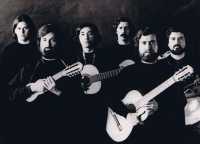Quilapayún are an instrumental and vocal folk music group from Chile and among the longest lasting and most influential exponents of the Nueva Canción Chilena (New Song) movement. Formed in Chile during the mid-1960s, the group became inseparable with the revolution that occurred in the popular music of the country under the Popular Unity Government of Salvador Allende.
Since its formation and during its forty year long history - both in Chile and during its lengthy period of exile in France - the group has seen modifications to its personnel lineup, to the subject and content of its work, and controversy regarding irreconciliable differences with the current and former group director.
Quilapayún originated in 1965 when Julio Numhauser, and the brothers Julio and Eduardo Carrasco formed a folk music trio which they simply called "the three bearded men" (viz. Quila-Payún) in the Mapuche language (viz. Mapudungun – the language of the people native to the region that is now the south of Chile, the Araucanians). Their first public performances were at the Universidad de Chile in Valparaíso organized by their first musical director, Ángel Parra (The son of Violeta Parra). In 1966 Patricio Castillo joined the group and they began performing and winning notoriety for their Andean music as well as their black ponchos which became the group's trademark. During this time they won their first prize, La Guitarra de Oro (The Golden Guitar) in the Primer Festival Nacional del Folkore "Chile Múltiple". (First National Festival of Folklore), they also made their first recording, appearing in one song of Ángel Parra, "El Pueblo" ("The People").
In one of these performances of 1966 in Valparaíso the group met with Víctor Jara with whom the group maintained a close and productive artistic association with for many years. At the request of the group, Víctor Jara becomes Quilapayún's musical director and he worked on the groups discipline, their stage performances and the style and content of the groups music and songs. Jara presents them to the record label Odeon Records, where they would record 5 LPs. Their first album, Quilapayún was basically an Andean music album but they included songs of Ángel Parra, Víctor Jara and new compositions of Eduardo Carrasco such as "La Paloma" and "El canto del cuculi".
Both Quilapayún and Inti-Illimani's recent paths have been marked by internal issues. Over the years some members left with others taking their place. In the case of Quilapayún, formed by the early members Carlos Quezada, Hernán Gomez, Rodolfo Parada, Hugo Lagos, Guillermo García and Ricardo Venegas, joined by Patricio Wang, continues to operate out of France, and has released two albums since 1989. Parada registered the name "Quilapayún" without the authorization of the other members. Because of this, as well as other irregular events, other historic members refused to continue with Parada and Wang, resulting in the group splitting into two, both claiming the name and legacy of Quilapayún, and subsequent litigation. The Chile-based historic faction is celebrating the group's 40 year anniversary performing concerts in Chile, Latin America and Europe together with the "historic" Inti-Illimani. These joint concerts have been advertised and promoted as Inti+Quila. The current "historic" lineup includes Eduardo Carrasco, Rubén Escudero, Ricardo Venegas, Guillermo García, Ismael Oddó (son of Guillermo "Willy" Oddó), Hugo Lagos, Hernán Gómez, Carlos Quezada and Sebastián Quezada (son of Carlos).
On December 5, 2007, the Court of Appeal of Paris forbade Parada and Wang’s group "from making use of the name QUILAPAYÚN, subject to a fine of 10 000 per infringement". This judgement was confirmed by the Highest Court of Appeal (Cour de Cassation de Paris) on the June 11, 2009.
